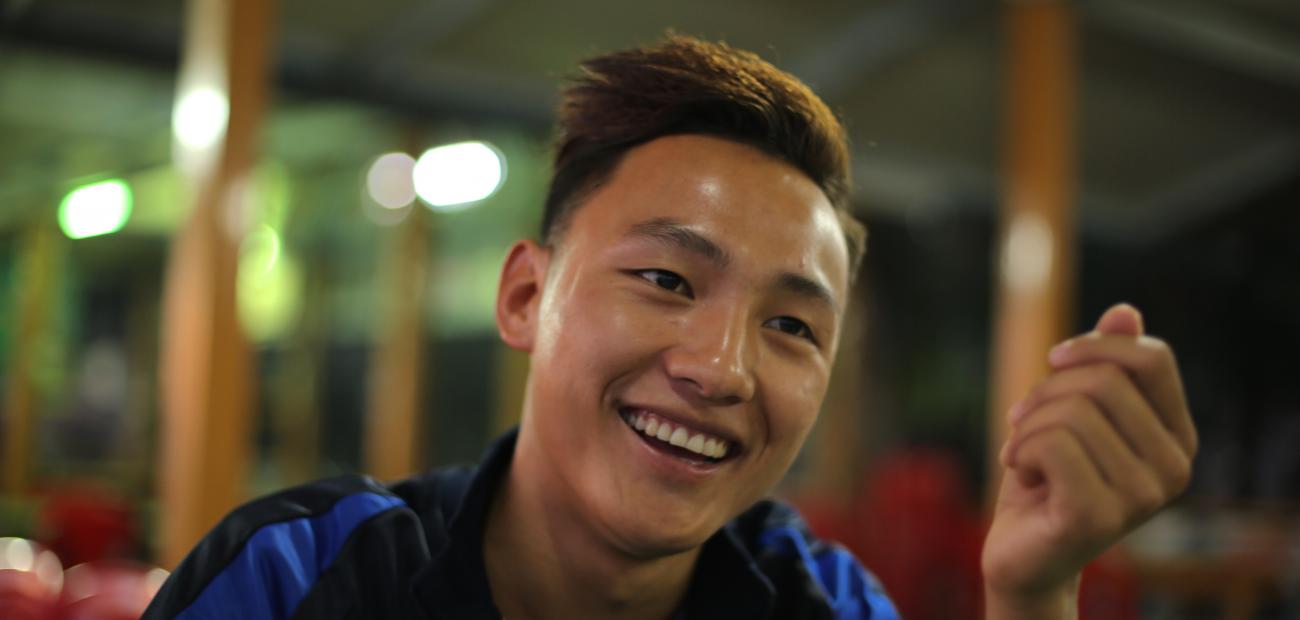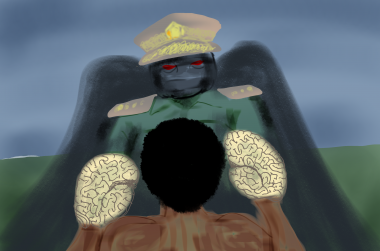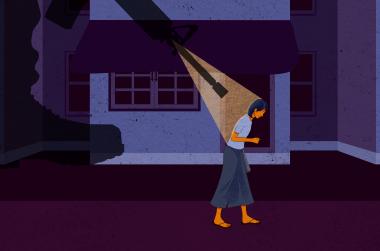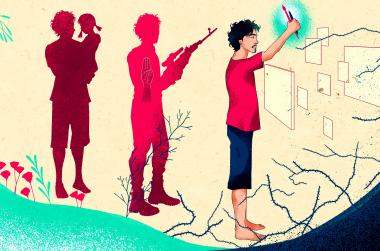It’s a rock-and-roll entrance. Naw Rain rides into the park on a motorbike, one hand on the handlebars, the other gripping the neck of his guitar. He is fashionably late and the evening light is sliding across the Manaw festival ground like fingers down a fretboard. But this budding pop star has not yet acquired the swagger of fame. Bashfully apologising for the delay he quickly takes up his guitar on the brightly-painted steps of a pavilion and launches into a heartfelt melody.
Behind him families amble in the grounds in the last blush of the day, as young girls nearby stop their selfie-poses to listen to the music.
The park is an important public place in war torn Kachin State. Crowned with soaring Manaw pillars, painted in colourful geometric designs, the grounds in the state capital Myitkyina are designed to hold a joyous annual festival where dancers in their finery whirl and spin, their bright clothes fluttering like bird wings. But the conflict that has engulfed the state has often caused the festival to be cancelled.
Much of the interest on the state in recent years has focused on the breakdown of a ceasefire between the army and Kachin rebels and the arbitrary abuse suffered by the Kachin people. The resurgence of heavy fighting in 2011 has displaced tens of thousands of people, many of whom are stuck in displacement camps dotted around the state unsure when they will be able to go home.
While the war rages, the state capital hustles on. It is a melting pot of cultures and religions on the banks of the wide Irrawaddy River, coursing its way south down the length of the country to the sea.
It is also home to an impressive number of popular singers. Naw Rain is hoping to join them.
But Myanmar, where culture was crushed under military rule, is not an easy place to be a rock star.
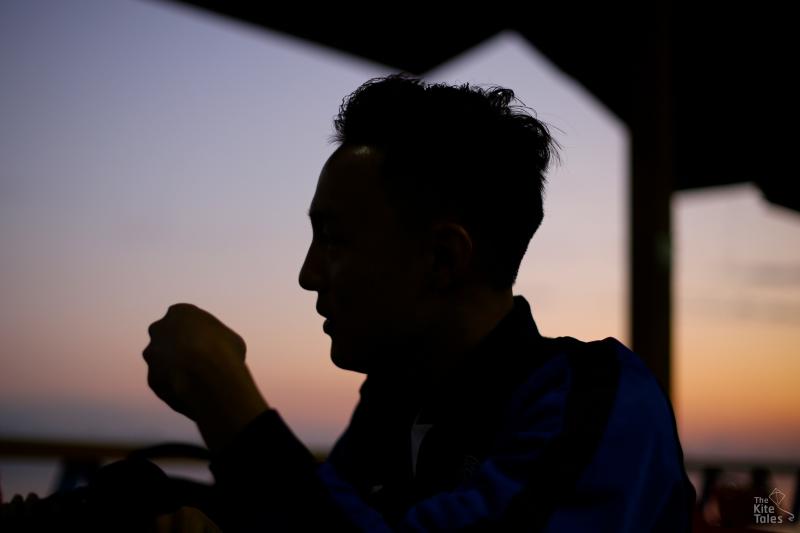
“It’s about missing my mother when I was travelling,” Naw Rain says shyly after he finishes singing. “The chorus is me calling out for her. That her son misses her so much and wants to send word that I love her very much.”
The 20-year-old’s boyish good looks and short hair tousled from the bike ride scream heartthrob -- like the Korean movie stars that send teenage hearts quivering here -- but he says he doesn’t dwell much on romance. Many of his songs are about his mum.
"I don’t know how to write about how much you love each other. Or at least I can only do that a little. The majority of my love songs are about unrequited love or being heartbroken,” he says.
His strong maternal bond stems from the death of his father when he was very small.
“I love my mum. Whenever I think of writing about fathers, I have no imagination whatsoever. I think it’s because I never experienced a father’s love. I grew up with only my mother around.
“I only know things my mother told me about him. She said I couldn’t even crawl when he died and I apparently went to sleep on top of him as I wasn’t aware he was dead."
His mother runs a small shop from home and managed to ensure her two sons and a daughter got a higher education.
“If you work today, then you'll be able to eat today. That’s how she raised us.”
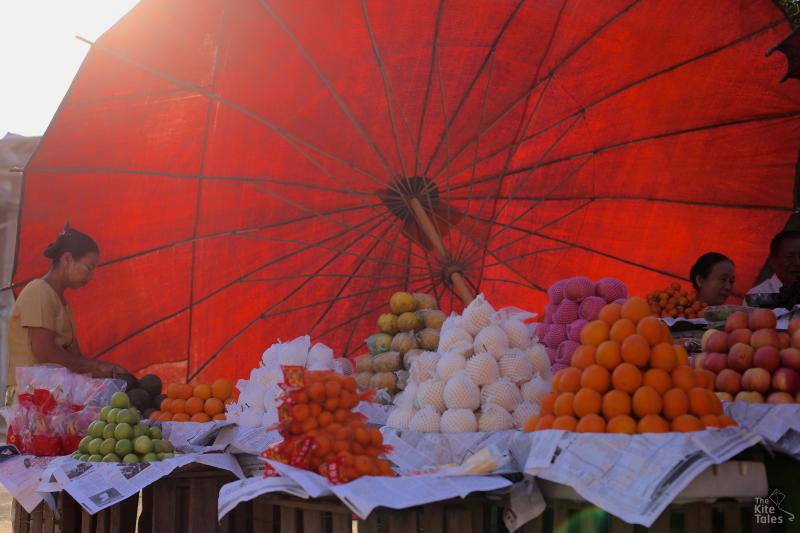
He was inspired to write the song when he was in Yangon chasing dreams of stardom as part of the Voice of the Youth competition in 2015. The annual tournament is organised by international NGO Turning Tables, which aims to empower marginalised young people around the world through music.
Dozens of people took part from across the country and the winners were chosen by popular vote.
“It had never occurred to me that I could win. There were so many people who had better voices. There were also two Naw Rains in the competition. When they announced that Naw Rain received the most votes, I was just relaxing because I didn’t think it was me. So my friend, Naw Rain, said ‘Hey, Naw Rain, they’re calling for you, you should go!’.
“I responded: ‘I don’t think so. Your voice is very good so it’s probably you’ and urged him to go.”
Eventually the judges confirmed he had won.
“So I walked up on stage. I was so surprised. Very happy and proud.”
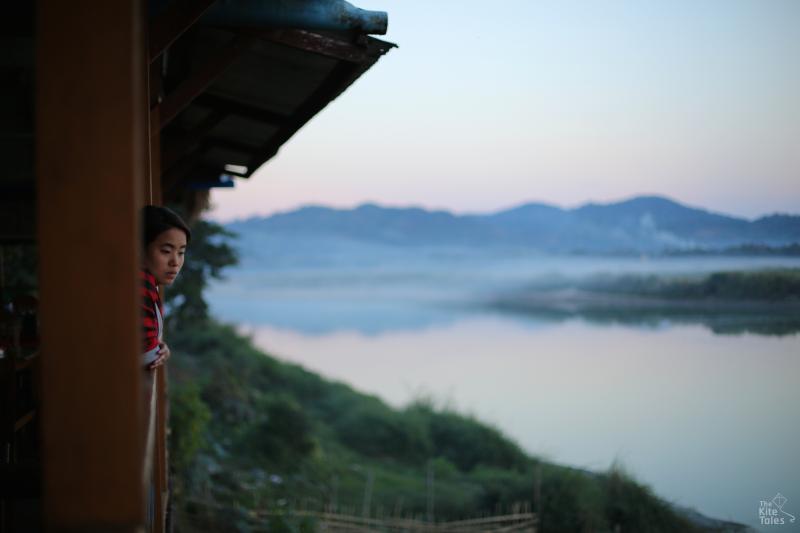
Naw Rain was about 10 years old when he first realised he wanted to play music, inspired by his Sunday school teachers who brought instruments to teach songs to the children.
“We were poor so we couldn’t afford good guitars like the others. So we just played with whatever there was. As long as it made sound. We’d just play, play, play.
“The guitar was so big and I was still so tiny. My elder brother learnt a little bit from guitar classes so I’d watch him play and then I’ll practice myself. That’s how I learnt. I still haven’t attended any classes.
“I’ve loved music so much since then.”
Conservative attitudes ingrained under the isolation of junta rule have acted to limit the places where young people can hang out. Public parks remain the most popular places for playing music and meeting friends. A real grassroots scene.
“Here, you have to go to the (park on) Strand road with your friends, take your guitar and play. But it closes by nine at night. There aren’t bars or other places where we can play.”
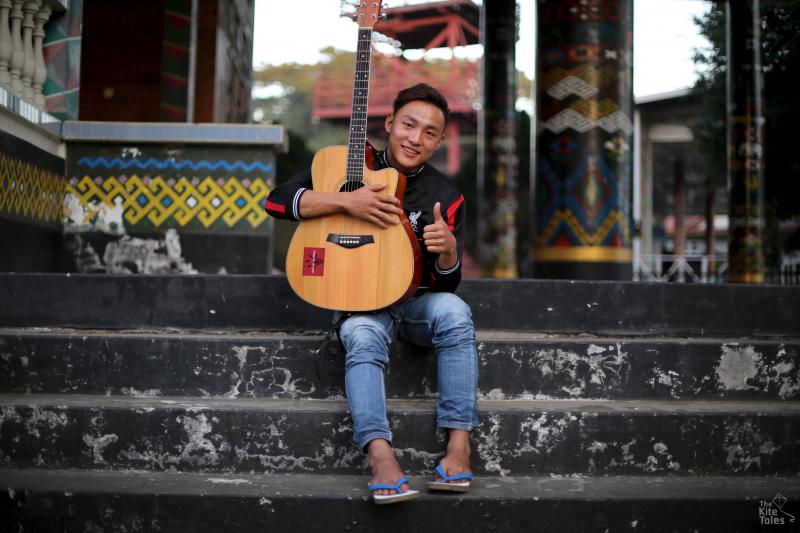
He lists Justin Bieber among his international idols though is unimpressed by the lack of musicianship among many global stars. But it’s Myanmar’s homegrown salty rock legends Iron Cross that he most looks up to.
“If we’re talking about bands, in Myanmar, Ko Lay Phyu inspires me,” he says, referring to the veteran group’s lead singer. But he says he is dogged by doubts.
“I want to be like that but I’m in a vicious cycle of trying to encourage myself and then putting myself down.”
He wants to produce an album but fears his lack of connections and money might doom his chances. For fame, he says, you need fortune.
Many artists relied for years on so-called “copy tracks”, where they recorded their own lyrics over the top of melodies from international hits — everyone from Michael Jackson to John Denver got the Myanmar makeover. The country’s opening has also ushered in a new era of copyright awareness and artists are vying to release original songs. But with piracy still rampant and tenuous distribution, a paying career in music remains out of reach for most artists.
“These days, it’s not the most crucial thing to have a good voice for you to produce an album. If you have capital, then you just plaster your posters everywhere before the CD comes out. Of course it takes time but you at least achieve a certain recognition and become friends with the singer community.
“I do think I can do it. But I think the support is even more important than your ability. I have no support,” says Naw Rain. But he is holding on to hope.
“I have faith it will happen. There isn’t a timeline but I’m determined.”
(Interviewed in Jan 2017)

